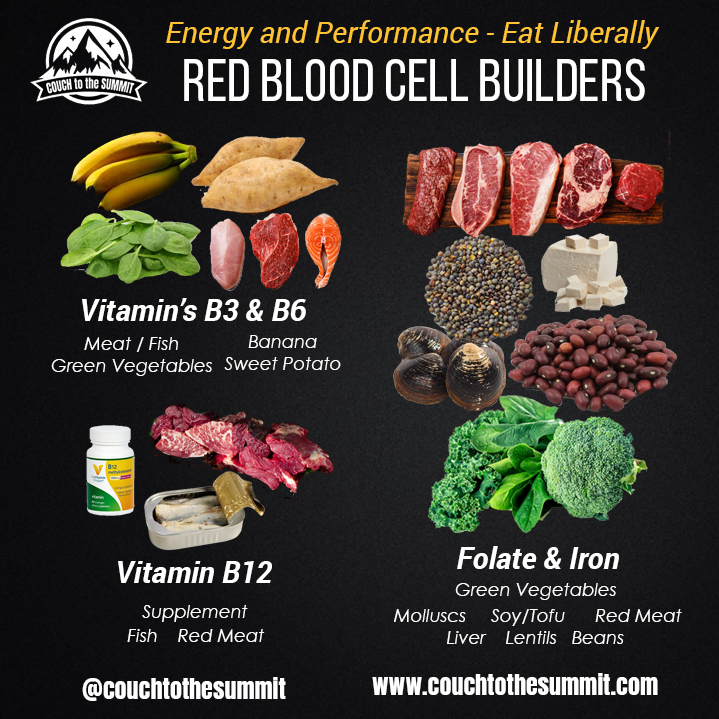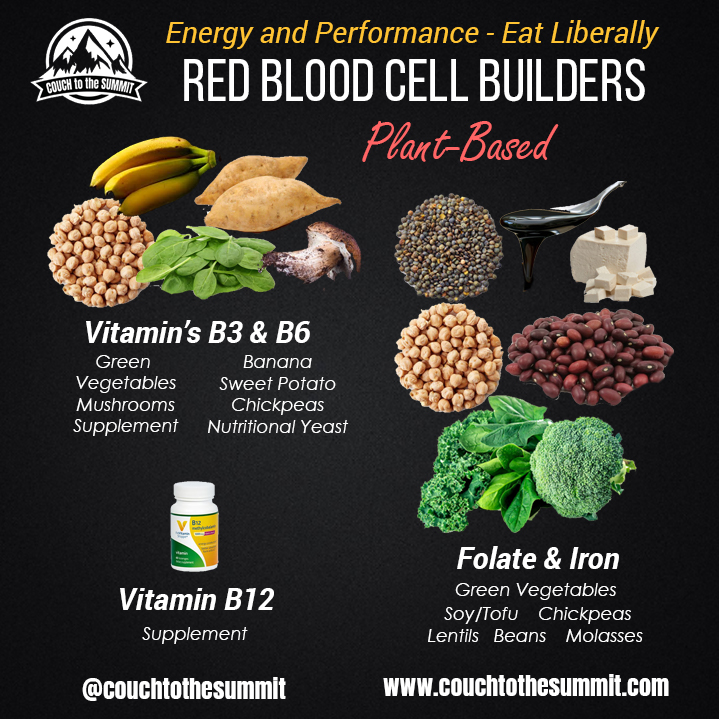Increasing Your Energy and Performance Through Nutrition: Red Blood Cell Creation Tips
I don’t have any special advantage—compared with normal people—that allows me to have the energy to adventure in the mountains as often as I do. It is something I have worked very hard to achieve after personally suffering the debilitating affects of Chronic Fatigue Syndrome in my 20’s. Now in my 40's, I have worked my way out of this chronic state of fatigue and low-energy. It wasn’t an easy road, and I still have to carefully manage my fatigue. I have never been able to train as often as many of my peers. My history with CFS, is also why I am a stimulant free athlete, and I do not consume caffeine at home or during events. This is a personal decision I make to ensure I do not push my body any harder than I already do, and helps me to maintain stable levels of energy throughout the day.
My turnaround from CFS all comes down to slowly and carefully increasing my aerobic base over 12 years, which now allows me to do quite amazing endurance feats I never thought were going to be possible. There is no real shortcut to this and you simply have to build over many years. The second factor was ensuring I ate properly and consistently over the last decade. This has been a long experimental journey, but I am certain of the nutritional combination that works best. It’s not just my opinion, it is also grounded in the scientific consensus regarding the vitamins and minerals needed to support red blood cell creation.
The higher you can naturally raise your haemoglobin and haematocrit levels, the more oxygenated your blood will be, and the more energy you will feel. When your cells can’t get enough oxygen as a result of too little haemoglobin, it’s called anaemia.

After taking a genetic test, I uncovered in my methylation cycle that I require to supplement with a form of folate called L-Methylfolate. For whatever reason, my genetic constitution requires elevated amounts to maintain my levels of energy and stop me going anaemic. I was also experimenting with plant-based diets to overcome my CFS, but I was not consuming enough B-Vitamins, especially B3, B6 and B12. I found to maintain a plant-based diet I required further supplementation, but I now eat a high plant-based diet with meat occasionally to reduce my requirements of supplementation, which I find works best for me.
These interventions as I describe below—was the discovery that elevated my haematocrit levels from the very low anaemic reading of 38 in 2010 to consistent levels of 47-48 over the past 6 years. The typical ranges for haematocrit for a male are 40-50 and for women 35-45. For a performance athlete you want to be in the higher range for your sex. A haematocrit over 50 will see you face serious scrutiny in many endurance races, as a probable doper.
The weakest link in your ability to have higher levels of energy and perform faster is your ability to transfer oxygen from the blood into the muscles. The more oxygenated red blood cells you have in your blood, the more you will be able to work harder and longer. Endurance athletes wanting to unnaturally boost their haematocrit and haemoglobin to improve their Vo2Max and endurance, dope with a synthetic version of the hormone erythropoietin (EPO), which substantially improves performance by elevating red blood cell creation. EPO works by stimulating your kidneys to produce new red blood cells from the bone marrow. Normally, your kidneys will make just the right amount of natural EPO so your RBC count remains normal, but synthetic EPO forces your body to significantly boost the RBC count. However, this is a serious health hazard and is also ethically and morally wrong.
Scientists and athletic trainers have long worked to find methods to naturally increase the body’s own EPO production. One of the best ways to increase EPO naturally is sleeping at high altitude. It was discovered that it’s best to live at high altitude and train at normal altitude for best training stimulus, known as the “live high, train low” principle. However, this is not practical for just about all people but the well-funded professionals.
There are natural ways to avoid becoming anaemic through proper nutrition that helps to naturally stimulate your own EPO production of red blood cells. This is the approach I have taken, and you should too. All athletes—and actually all people in general-should be eating a diet with liberal amounts of foods that help to increase this process.
Most people know they should be eating enough Iron in their diets, but they may not know the important role of a number of other vitamins and nutrients, which are just as crucial to maintaining healthy red blood cell counts.
What you can do is eat properly to ensure you consume enough B3, B6, B12, Folate and Iron in your diet. All of these vitamins and minerals are the backbone of your red blood cell creation. Deficiencies of folic acid and also B6 and B12 especially, can lead to serious conditions such as depression, anxiety, insomnia, immune system problems, tiredness and fatigue.
A large bulk of my diet comes from the foods listed in these info-graphics along with some supplementation when needed. If I am not careful with my diet and ensuring I cross all the t's and dot the i's with the following vitamins and minerals, then my fatigue and tiredness comes back and hits me hard very quickly.

Vitamin B3 - Niacin
Your body requires this vitamin to produce new red blood cells. The richest sources of this vitamin are meat and fish sources, so plant-based dieters are at significant risk of low energy without consuming enough of this vitamin.
Plant-based sources include nutritional yeast, mushrooms, brown rice, potatoes and some green vegetables. However, these levels are often far lower than meat sources, so I believe supplementation is needed for plant-based dieters just to be on the safe side. People with fatigue or low-energy levels should also consider supplementing.
Supplementation: Niacinamide (Bioavailable form of Vitamin B3) 250mg / day. (Highly recommended for plant-based diets).
Vitamin B6 - Pyrodixine
Multiple studies have linked low levels of vitamin B6 to low haemoglobin and anaemia resulting in you feeling constantly tired and sluggish. Your body requires this vitamin to produce new red blood cells because its is essential for haemoglobin to form. A red blood cell cannot function without haemoglobin because it is the part of a red blood cell oxygen attaches to. When you have low haemoglobin, your cells don’t get enough oxygen. As a result, you may develop anaemia and feel weak or tired. B6 deficiency can also potentially contribute to tiredness due to its role in making the sleep-promoting hormone melatonin.
Like Vitamin B3, meat-sources are the highest of this vitamin. However, the divide is not as wide for the plant-based dieters with this vitamin, as sweet potatoes, bananas, sunflower seeds and spinach provide good amounts. I still recommend plant-based dieters or people with fatigue, low-energy levels supplement with P-5-P.
Supplementation: P-5-P (Bioavailable form of Vitamin B6) 40mg / day (definitely not more than 100mg). Highly recommended for plant-based diets.
Vitamin B12
The discovery of vitamin B12 was the culmination of a 10-year search for the factor in liver that would control pernicious anaemia. In 1947, the first isolated form of vitamin B12 was produced, and the compound was tested on a patient suffering from pernicious anaemia and it cured her. B12 was later found to be a key growth factor in animals, and enhancing the diets of livestock greatly increased yields. B12 is significant in red blood cell creation and tissue growth.
Dietary sources of B12 are not high, because we used to get most of our B12 from dirt that would often accompany food. In more sanitary times, food sources are confined largely to fish (such as sardines) and red meat. Plant-based eaters must supplement with B12, because there are no real sources for them in this diet.
If you are deficient in vitamin B12, new red blood cells may be created in a deformed or malfunctioning state, which will severely affect oxygen transport. A blood-test which asks for B12 levels can tell you whether you are deficient.
Supplementation: Best forms Hydroxocobalamin or Methylcobalamin either injectable or sub-lingual. Highly recommended for all diets. You are best advised to work with your doctor on a supplementation program.
Folate
Dietary forms of folate include green vegetables, yeast, egg yolk, liver and kidney. Meat-eaters are at a higher risk of folate deficiency if they do not consume liberal amounts of vegetables, especially dark green leafy ones.
Folate is another key factor in red blood cell creation. A deficiency in folate can lead to megaloblastic anaemia, where the red blood cells are larger than normal, and fewer in number. They also don’t live as long as normal red blood cells.
Drinking alcohol also lowers your folate and is best avoided if you have fatigue or want to perform optimally as an athlete. If you continue to drink, then increase your dark green leafy vegetable consumption as a result.
Supplementation: Best form L-Methylfolate (Bioavailable form of Folate) is a bioavailable form of folic acid that can quickly cross the blood-brain barrier. Taking traditional forms of folic acid is more ineffective, because the body must take additional steps to convert folic acid into L-methylfolate. Some people lack the ability to convert folic acid to L-methylfolate. Additionally, folic acid is best avoided entirely because it will compete with supplemented L-methylfolate for uptake in the body. Highly recommended for any diets low in dark leafy green vegetables.
Iron
Oxygen doesn’t bind directly to the red blood cell; it binds with haemoglobin. For your body to make haemoglobin, it needs iron. Iron is absolutely necessary for enhancing endurance, a deficiency in this mineral significantly impairs oxygen transport in the blood.
The best sources of iron are haem iron which comes in red meat. Plant based sources of non-haem iron (which is harder for the body to uptake) includes Tofu, lentils, beans and green vegetables such as spinach. I eat large amounts of all these foods in my diet. Your body only absorbs about 10% of the iron that you eat in the digestive tract, unless you consume sufficient vitamin C along with it.
Supplementation: Best form Ferrochel. During hard training periods, I like to take a supplement containing Ferrochel, which is a chelated form of Iron that is extremely well tolerated by the gastrointestinal system and has a very high absorption rate. Highly recommended for plant-based diets and during intensive training periods for all diets.
If iron supplements are used, it is important that the level of supplementation is not excessive, as excess iron in the diet can result in an induced zinc deficiency, which will significantly compromise your immune system.